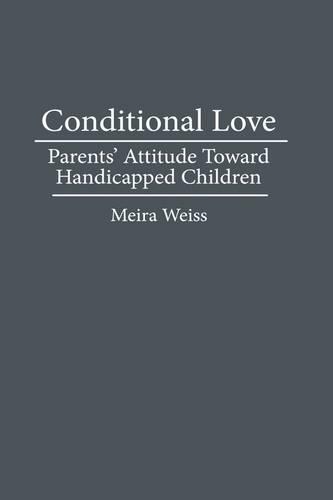
Conditional Love: Parents' Attitudes Toward Handicapped Children
(Hardback)
Publishing Details
Conditional Love: Parents' Attitudes Toward Handicapped Children
By (Author) Meira Weiss
Bloomsbury Publishing PLC
Praeger Publishers Inc
28th February 1994
United States
Classifications
Tertiary Education
Non Fiction
Disability: social aspects
Behaviourism, Behavioural theory
306.874
Physical Properties
Hardback
312
Width 156mm, Height 235mm
624g
Description
Questioning the myth of unconditional love between parents and children, this study examines the strength of the parental bond when children are born with physical defects. The author, a social scientist, studied parents' behavior toward 1,450 children born with defects in three hospitals in Israel, and then conducted follow-up studies over a period of six years with 200 families in their homes. One of the major recurring patterns of parental behavior was a massive tendency toward rejection of deformed children. Rejection was manifested by parents' wishes for drastic separation from their children through abandonment, institutionalization, or giving up for adoption. If brought home, the children were isolated and hidden from view. Weiss found that half of the newborns with physically observable defects were abandoned by their parents in the hospital. Even when the parents were assured by doctors that their children would develop intellectually or would not require special care, the tendency to abandon remained strong. Normal children who suffered physical deformity due to burns or other accidents were similarly rejected by their parents. This study will take a major place in the literature on human behavior because through exhaustive and long-term observation of actual behavior in thousands of individual situations, it exposes the extreme importance of physical appearance in interpersonal relations. The author describes how the deformity causes confusion in the parents' cognitive system, labelling the child with a name such as monster or devil or creature, or another non-human category. Parents' reactions to their children's body image are discussed and the concept of body boundaries is analyzed. Children connected to medical apparatus or sickly children are the cause of much parental rejection. Also, territorial restrictions are placed on the deformed child in the home. These range from closeting or imprisoning in unfurnished surroundings separate from the family to demotion to servant status within the family. This study refutes most assumptions in the literature and shows that forming bonds with one's biological child is not necessarily spontaneous, automatic, or natural, and that every child undergoes a process of adoption or rejection based on external appearance and whether or not that appearance matches the parents' image of a person. Hospital personnel, social workers, sociologists and anthropologists will be profoundly influenced by this work, as will be all others who read it.
Author Bio
MEIRA WEISS is a lecturer in the Department of Sociology and Anthropology at the Hebrew University of Jerusalem. Her Hebrew edition of Conditional Love has received wide acclaim. Dr. Weiss has worked extensively in the medical profession in Israel and is a certified Gestalt therapist as well as a sociologist.
